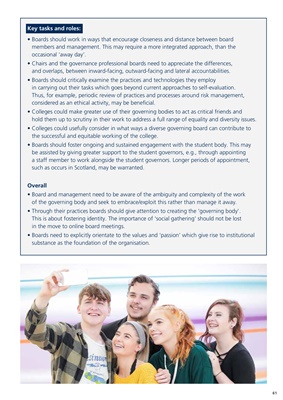
61
• Boards should work in ways that encourage closeness and distance between board
members and management. This may require a more integrated approach, than the
occasional 'away day'.
• Chairs and the governance professional boards need to appreciate the differences,
and overlaps, between inward-facing, outward-facing and lateral accountabilities.
• Boards should critically examine the practices and technologies they employ
in carrying out their tasks which goes beyond current approaches to self-evaluation.
Thus, for example, periodic review of practices and processes around risk management,
considered as an ethical activity, may be beneficial.
• Colleges could make greater use of their governing bodies to act as critical friends and
hold them up to scrutiny in their work to address a full range of equality and diversity issues.
• Colleges could usefully consider in what ways a diverse governing board can contribute to
the successful and equitable working of the college.
• Boards should foster ongoing and sustained engagement with the student body. This may
be assisted by giving greater support to the student governors, e.g., through appointing
a staff member to work alongside the student governors. Longer periods of appointment,
such as occurs in Scotland, may be warranted.
Overall
• Board and management need to be aware of the ambiguity and complexity of the work
of the governing body and seek to embrace/exploit this rather than manage it away.
• Through their practices boards should give attention to creating the 'governing body'.
This is about fostering identity. The importance of 'social gathering' should not be lost
in the move to online board meetings.
• Boards need to explicitly orientate to the values and 'passion' which give rise to institutional
substance as the foundation of the organisation.
Key tasks and roles: